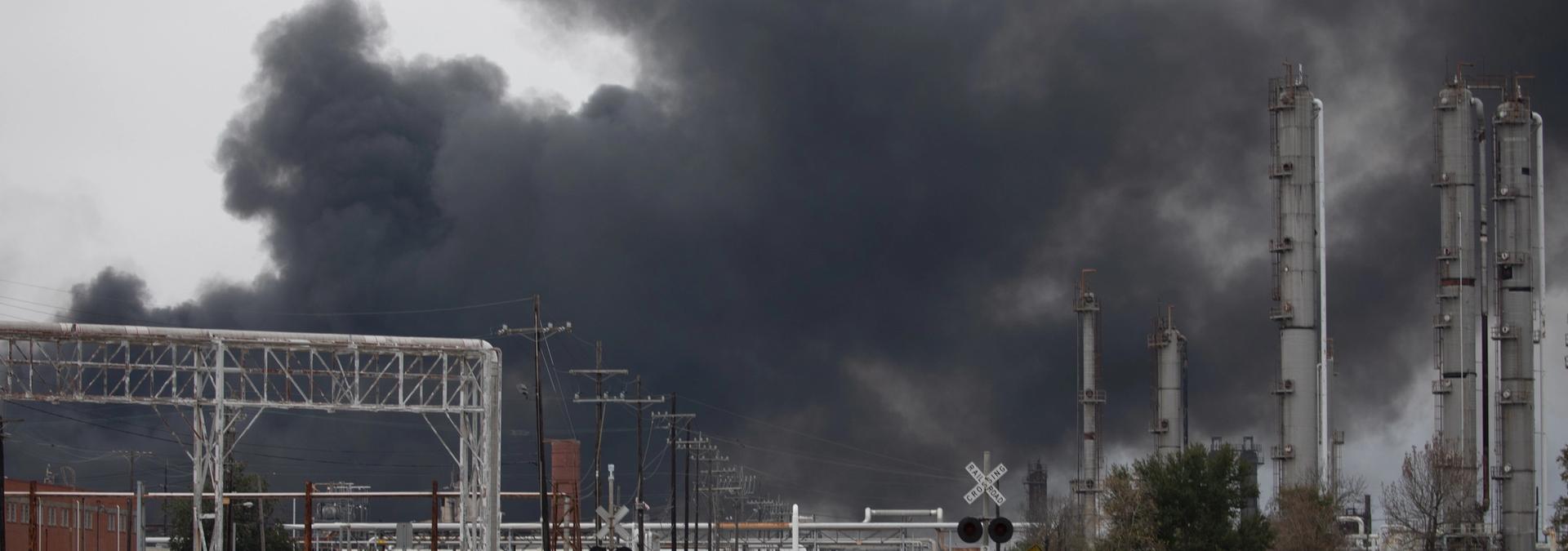
Why doesn't TCEQ fine polluters more?
Under current state law, the maximum fine TCEQ can levy for violating air permits is just $25,000 per day. Photo: Julie Dermansky.
A massive stockpile of ammonium nitrate fueled the blast in Beirut that killed 150 people and injured 50,000 more.
That’s the same chemical that exploded in West, Texas, in 2013, shattering the quiet community north of Waco and killing 15 people. And it was the same chemical that exploded in Texas City in 1947, killing almost 600.
From 1947 to 2013 to 2020, despite the well-documented history, not nearly enough has changed in Texas to prevent chemical disasters like these, Elena Craft, senior director for climate and health with Environmental Defense Fund, told the Associated Press last week. “It gets to be accepted business.”
It doesn’t have to be. The disasters can be prevented. But they keep happening, and when they do, they’re displacing, sickening, maiming and killing Texans. The state has a history of protecting industry before people and issuing penalties for environmental violations that simply aren’t harsh enough to deter big companies. In Texas, it costs $25,000 to spew too much cancer-causing benzene in the air, but a billion-dollar company takes in $25,000 about every 13 minutes.
The outcome? Last year in the region, from northwest Houston to Port Neches, six chemical explosions collectively resulted in four deaths, countless injuries, the forced evacuation of 50,000 people at Thanksgiving, pollution that closed the Ship Channel for three days and cost $1 billion in economic losses and a sinister plume of dark smoke that inflamed airways, rattled nerves and altered weather patterns. Right now, Arkema executives are on trial for their decision not to move a stockpile of another chemical, which exploded during Hurricane Harvey, hospitalizing at least 23 people and creating lingering health impacts for first responders and neighbors.
Rep. Erin Zwiener, a fifth-generation Texan with a degree in natural resource management, wants the state to get tougher on reckless industry. The Democrat from Driftwood introduced a bill in the 2019 legislative session calling for Texas Commission on Environmental Quality (TCEQ) penalties to be at least equal to the value of the economic benefit gained by violators.
Right now, in Texas, it can cost less to be caught polluting than to continue to pollute. And industry is banking on that.
“If it is cheaper for folks to violate the law than it is for them to follow it,” Zwiener, a member of the House Environmental Regulation Committee, says, “bad actors are going to take advantage.”
Why doesn’t TCEQ penalize bad actors more? Under current state law, the maximum fine the agency can levy against industry for violating their air, hazardous waste and water permits is just $25,000 per day, per violation. (In contrast, the federal Clean Air Act allows the Environmental Protection Agency to levy nearly $100,000 fines per day.)
In Texas, the math of these low penalties — often negotiated even further down with TCEQ, which tends to treat incidents that violate dozens of permits as a single violation — equals just pennies on the pound for spewing pollution that robs Texans of quality of life and causes serious health problems, from asthma to lung disease to cancer to premature death.
All told, by refusing to assess a fine for each permit violation, TCEQ could be leaving as much as $2.3 billion in fines on the table, as it did in 2017 while its budget is being cut by state lawmakers.
Zwiener’s bill — HB 3035 — fared a little better than most aimed at reining in the abuses of industry. Most such legislation goes nowhere, and Zwiener actually got a committee hearing. But her bill never received a floor debate or vote. She vows to revise it and try again in the 2021 Legislature.
It’s been like this in this state for too long. Luke Metzger, executive director of Environment Texas, has tracked TCEQ’s ineffectual approach to enforcement for more than two decades. He says the agency can seem less interested in going after those billion-dollar companies than small operators, such as gas station owners.
“They have more political and legal power — the big operators already have lawyers on retainer, while the little gas station can’t afford to hire an attorney to represent them,” he said.
A Texas Observer investigation found that from 2009 to 2017, TCEQ collected $24 million from little gas stations and other tank operators, many of them independently run, for minor recordkeeping errors, while collecting a mere $30 million from the thousands of major refineries, concrete batch plants and other industrial behemoths that violated their permits. That’s when the agency takes action, at least. Environment Texas also found that between 2011 and 2016, TCEQ has enforced no more than 3 percent of the total number of emissions events, and the volume of emissions doubled between 2017 and 2018.
Everyday Texans are paying the biggest price.
“Every Texan deserves access to clean air and clean water, and to have that we need a proactive industry that is determined to avoid violations,” Zwiener says. “The best way to ensure that and the best way to build that culture is for TCEQ to step up its enforcement and raise its penalties.”
This article originally appeared in the Houston Chronicle.
Coleman is the communications strategist for Public Citizen’s Texas office.
STAY UP TO DATE
The quality of our newsletter is considered satisfactory and poses little or no risk.
SUBSCRIBE

